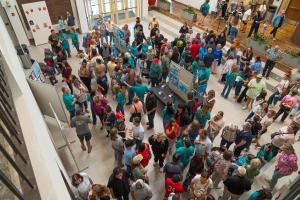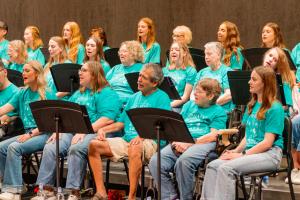Concert, Art Exhibit Mark End of Two-Week Arts Program for Individuals with Aphasia
When we use the arts as a form of therapy, we’re tapping into the right side of the brain, and we’re using the right side to mediate or to help the damaged left side of the brain.”
LUBBOCK, TX, UNITED STATES, June 18, 2025 /EINPresswire.com/ -- Families, friends and members of the Lubbock community showed their support for the arts and those with aphasia at a June 12 concert and art exhibit marking the end of a two-week arts camp. The free event, held at the Texas Tech University Charles E. Maedgen Jr. Theatre, included performances and artwork by program participants. — Melinda Corwin, Ph.D.
The Summer Aphasia Arts Program is held by the Texas Tech University Health Sciences Center (TTUHSC) School of Health Professions Stroke and Aphasia Recovery (StAR) Program in partnership with the Texas Tech University J.T. & Margaret Talkington College of Visual & Performing Arts (TCVPA). The annual camp focuses on visual art, choir and drama for stroke and traumatic brain injury survivors who have a type of communication challenge called aphasia. It serves as a creative outlet for these individuals.
“The summer arts portion of the StAR Program is an intensive, summer program that runs the first two weeks of June,” Melinda Corwin, Ph.D., professor and assistant director, Department of Speech, Language and Hearing Sciences, said. “The program is for stroke survivors and people with primary progressive aphasia.”
Aphasia is a language disorder that affects the part of the brain responsible for language. More than two million people in the U.S. are estimated to have aphasia and have lost all or some ability to use words. It also affects their ability to understand what others are saying to them, or to understand symbols of language on a page. The person may have trouble reading, texting, typing or communicating via email. The condition ranges from mild to severe and can happen to anyone who experiences a stroke, traumatic brain injury, brain tumor or degenerative brain disease.
It does not affect intelligence.
“Typically, aphasia involves damage on the left side of the brain, which is our language center for spoken and written words,” Corwin said. “When we use the arts as a form of therapy, we’re tapping into the right side of the brain, and we’re using the right side to mediate or to help the damaged left side of the brain. We use visual arts and performing arts such as choir and drama, and we find that it really helps to promote language and communication.”
The summer arts camp is an extension of the StAR Program, an annual nine-month initiative that runs September through May.
Suzanna Cisneros
Texas Tech University Health Sciences Center
+1 806-773-4242
email us here
Legal Disclaimer:
EIN Presswire provides this news content "as is" without warranty of any kind. We do not accept any responsibility or liability for the accuracy, content, images, videos, licenses, completeness, legality, or reliability of the information contained in this article. If you have any complaints or copyright issues related to this article, kindly contact the author above.


